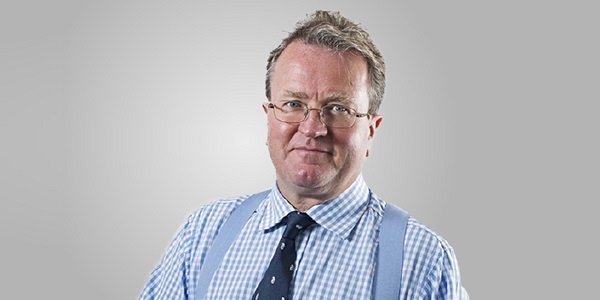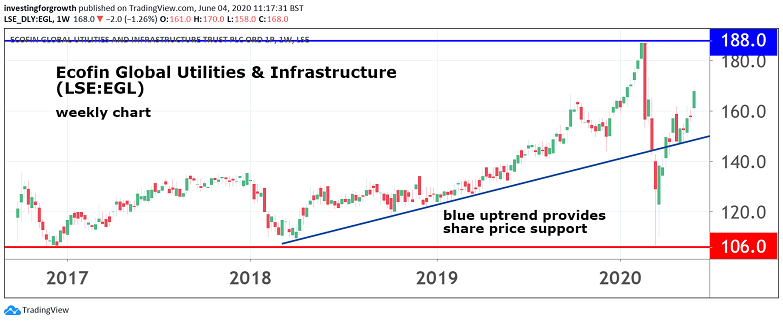The Ian Cowie portfolio: how I’m receiving inflation-busting income
Our columnist tracks down big dividends plus capital growth going cheap in this untrendy sector.
4th June 2020 11:22
by Ian Cowie from interactive investor
Our columnist plays detective and tracks down big dividends plus capital growth going cheap in this untrendy sector.

Dividends are being cut by many of Britain’s biggest companies, but investment trusts are still delivering inflation-busting income to shareholders willing to accept some risk. As I know from personal experience, overlooked funds in unfashionable sectors can produce capital growth as well as a decent yield, despite all the woes of the coronavirus crisis.
Last week I received my latest quarterly dividend from Ecofin Global Utilities & Infrastructure (LSE:EGL) (stock market ticker: EGL). Its 4.2% yield was all the more welcome because this followed only a few weeks after the oil giant Royal Dutch Shell (LSE:RDSB) said it would cut its dividend for the first time since the Second World War.
By contrast, EGL announced a modest increase in investors’ income, as it aims to pay 6.6p per share, or 3.1% more than the year before. Better still for EGL, it has delivered total returns of 26% over the last year, according to independent statisticians Morningstar, while Shell shareholders have suffered an eye-watering 50% loss over the same period.

Source: TradingView. Past performance is not a guide to future performance.
I only wish I had sold all my Shell when I invested in EGL most recently, at 152p per share in September 2019. I first invested nine years ago, when this trust traded as Ecofin Water & Power Opportunities but sold up in 2012.
Now, as then, the idea is to do well by doing good because EGL combines environmentally-friendly assets with steady-Eddie regulated utilities, such as the electricity distributors, National Grid (LSE:NG.) and SSE (LSE:SSE). Solar and wind farms account for more than a fifth of EGL’s underlying assets, but it trades at a modest 1.3% discount to net asset value (NAV).
That looks like good value when you consider that the average share in the Association of Investment Companies (AIC) ‘renewable energy infrastructure’ sector trades at a 13% premium to NAV. So followers of fashion buying into that obviously ‘green’ investment trust sector today must typically pay £1 for 87p of underlying assets.
- Here's how different UK fund managers have fared during the pandemic
- Company fundraisings: what you need to know
- 10 fund managers that have beaten every rival fund since they started managing their funds
- Subscribe to our YouTube channel and be first to see our upcoming fund manager videos. Just click here now.
One reason we can still buy £1 of EGL’s assets for less than 99p is that it sits in the AIC’s small and unfashionable ‘infrastructure securities’ sector. It is this sector's top-performer by a country mile over the last year, but that scarcely counts for much when it has only one rival, the split-capital investment trust Premier Global Infrastructure (LSE:PGIT), where the ordinary shares are down 0.7% and the zero dividend preference shares are up 1.7%.
More importantly, EGL’s underlying portfolio should continue to preserve capital and produce income as the global economy struggles to recover from the coronavirus crisis. Iain Scouller of the stockbroker Stifel said: “We would expect listed infrastructure and utilities companies to be relatively resilient in the current recession.
“EGL's investments in regulated businesses and many diversified integrated utilities provide shelter, while economically sensitive infrastructure services such as roads and airports remain weak.
“Its dividend yield of 4.2% is quite attractive in the current environment, and we maintain a positive recommendation.”
This investment trust’s fund manager, Jean Hugues De Lamaze, told me: “Central bank and government interventions are positive but cannot save the equity markets from fear of a sharp economic downturn.
“The low interest rate context may be assured for some time. This is typically a favourable context for EGL’s investment universe which consists of long-duration businesses.
“Secular growth drivers coming from the acceleration of renewable development and the necessity to upgrade power grid infrastructures remain intact. Dividends of companies in the portfolio are well covered by cash flows and earnings and we see little risk of dividend cuts for the vast majority of the portfolio.”
Against all that, AIC data shows this trust has no dividend cover or reserves - although more information is likely to become available when it reaches its fifth anniversary in its current format this September. Dividends are due to be paid on the last day of August and November - then next February and May.
- Top 10 funds, trusts and shares in May 2020
- Funds Fan: fallen-star departs, trust dividend cuts, and top investor interview
- Take control of your retirement planning with our award-winning, low-cost Self-Invested Personal Pension (SIPP)
An international portfolio - currently 40% in America; 37% Continental Europe; 15% UK; 7% in other Organisation for Economic Co-operation and Development (OECD) countries and 1% emerging markets - should diminish risk by diversification. That’s important for income-seekers in highly uncertain times, when even Shell can shock on the downside.
Full disclosure: Ian Cowie is a shareholder in EGL and RDSB as part of a global portfolio.
Ian Cowie is a freelance contributor and not a direct employee of interactive investor.
Full performance can be found on the company or index summary page on the interactive investor website. Simply click on the company's or index name highlighted in the article.
These articles are provided for information purposes only. Occasionally, an opinion about whether to buy or sell a specific investment may be provided by third parties. The content is not intended to be a personal recommendation to buy or sell any financial instrument or product, or to adopt any investment strategy as it is not provided based on an assessment of your investing knowledge and experience, your financial situation or your investment objectives. The value of your investments, and the income derived from them, may go down as well as up. You may not get back all the money that you invest. The investments referred to in this article may not be suitable for all investors, and if in doubt, an investor should seek advice from a qualified investment adviser.
Full performance can be found on the company or index summary page on the interactive investor website. Simply click on the company's or index name highlighted in the article.